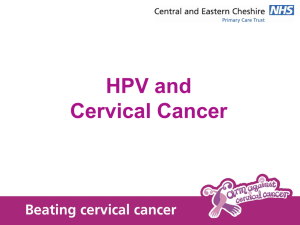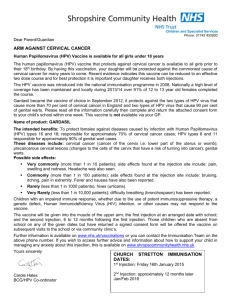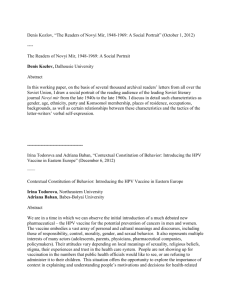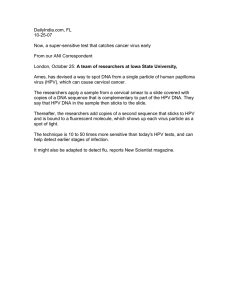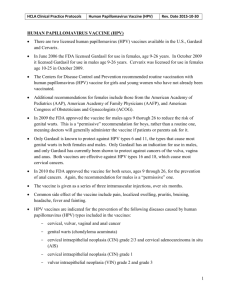Your questions about the HPV vaccination answered
advertisement
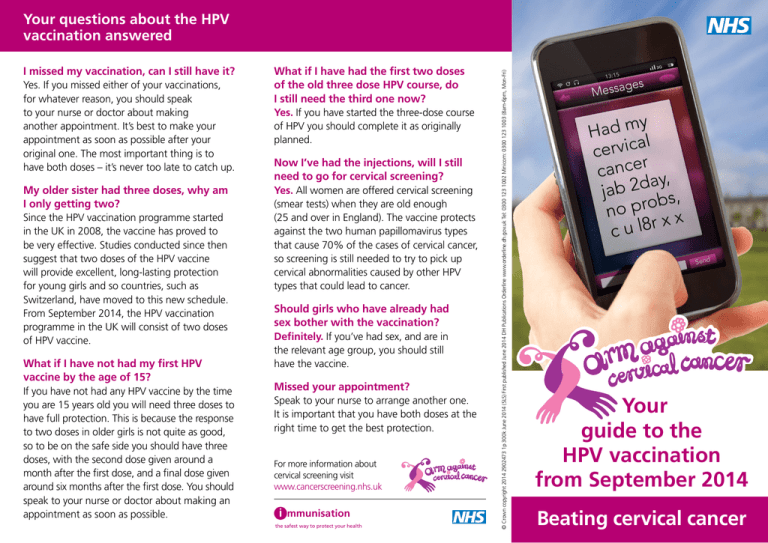
I missed my vaccination, can I still have it? Yes. If you missed either of your vaccinations, for whatever reason, you should speak to your nurse or doctor about making another appointment. It’s best to make your appointment as soon as possible after your original one. The most important thing is to have both doses – it’s never too late to catch up. My older sister had three doses, why am I only getting two? Since the HPV vaccination programme started in the UK in 2008, the vaccine has proved to be very effective. Studies conducted since then suggest that two doses of the HPV vaccine will provide excellent, long-lasting protection for young girls and so countries, such as Switzerland, have moved to this new schedule. From September 2014, the HPV vaccination programme in the UK will consist of two doses of HPV vaccine. What if I have not had my first HPV vaccine by the age of 15? If you have not had any HPV vaccine by the time you are 15 years old you will need three doses to have full protection. This is because the response to two doses in older girls is not quite as good, so to be on the safe side you should have three doses, with the second dose given around a month after the first dose, and a final dose given around six months after the first dose. You should speak to your nurse or doctor about making an appointment as soon as possible. What if I have had the first two doses of the old three dose HPV course, do I still need the third one now? Yes. If you have started the three-dose course of HPV you should complete it as originally planned. Now I’ve had the injections, will I still need to go for cervical screening? Yes. All women are offered cervical screening (smear tests) when they are old enough (25 and over in England). The vaccine protects against the two human papillomavirus types that cause 70% of the cases of cervical cancer, so screening is still needed to try to pick up cervical abnormalities caused by other HPV types that could lead to cancer. Should girls who have already had sex bother with the vaccination? Definitely. If you’ve had sex, and are in the relevant age group, you should still have the vaccine. Missed your appointment? Speak to your nurse to arrange another one. It is important that you have both doses at the right time to get the best protection. For more information about cervical screening visit www.cancerscreening.nhs.uk i mmunisation the safest way to protect your health © Crown copyright 2014 2902473 1p 300k June 2014 (SLS) First published June 2014 DH Publications Orderline www.orderline.dh.gov.uk Tel: 0300 123 1002 Minicom: 0300 123 1003 (8am-6pm, Mon-Fri) Your questions about the HPV vaccination answered Your guide to the HPV vaccination from September 2014 Beating cervical cancer What is cervical cancer? Cervical cancer develops in the cervix (the entrance to the womb – see diagram below). It is caused by a virus called the human papillomavirus or HPV. The HPV vaccine There are many types of human papillomavirus. The HPV vaccine protects against the two types that cause most cases (over 70%) of cervical cancer. Cervical cancer can be very serious. After breast cancer, it is the most common women’s cancer in the world. In the UK, around 3000 cases of it are diagnosed every year and about 1000 women die from it. Because the vaccine does not protect you against all of the other types, you will still need to have cervical screening (tests that pick up early signs of changes in the cervix) when you are older. Fallopian tube Ovary Uterus (womb) Cervix Vagina HPV and how it spreads The human papillomavirus is very common and you catch it through intimate sexual contact with another person who already has it. Because it is so common, most people will get infected at some point in their lifetime. In most women, the virus does not cause cervical cancer. But having the vaccine is important because we do not know who is at risk. Having this vaccine will also protect you against the two types of HPV that cause the majority of cases of genital warts. It won’t protect you against any other sexually transmitted diseases such as chlamydia and it won’t stop you getting pregnant. Please don’t forget that cervical screening (smear tests) will continue to be important whether you have had the HPV vaccination or not. Having the vaccination You will need two injections. When you are in year 8 you will be offered the first injection. You will be called for the second injection six to 12 months after the first, but it can be given up to 24 months after. Your school or GP will inform you when you will actually have the second dose. It’s important that you have both doses to be fully protected. The nurse will give you the vaccination in your upper arm. The HPV vaccine is offered routinely to all girls starting in school year 8 (aged 12-13 years). The vaccine is recommended for all girls from the age of 12 years up to their eighteenth birthday. Adolescent girls who have the vaccination will reduce their risk of getting cervical cancer by over 70% Side effects Like most injections, the side effects of the HPV vaccination are quite mild. Soreness, swelling and redness in the arm are common but wear off in a couple of days. More serious side effects are extremely rare. The vaccine meets the rigorous safety standards required for it to be used in the UK and other European countries. See www.nhs. uk/hpv or see the patient information leaflet (PIL) if you’d like more information on side effects. Giving consent You will probably want to share information about the vaccine with your parents and discuss it together. If you are being offered the vaccination at school, you may be given a consent form that your parent/guardian or you should sign giving permission for you to have the vaccination. Information about your vaccinations will be added to your NHS records. The nurse or doctor will discuss the HPV vaccination with you at your appointment and will be able to answer any questions you may have. More information Visit www.nhs.uk/hpv where you can download a question-and-answer sheet that gives more detailed information on the topics covered in this leaflet. A complete list of ingredients for the vaccine is given in the: Patient Information Leaflet (PIL) www.medicines.org.uk/emc/medicine/19033/ pil/gardasil and the Summary of Product Characteristics (SPC): www.medicines.org.uk/ emc/medicine/19016/SPC/gardasil/

